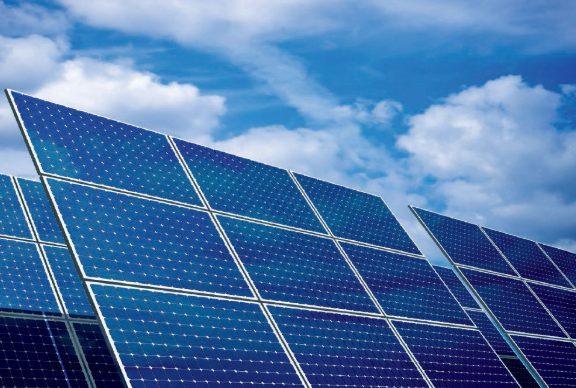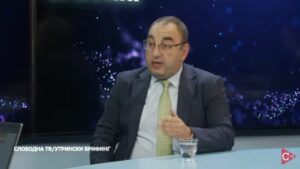Interest in photovoltaics, but also numerous procedures - on the move of the institutions

The state should at all times have plots of land available for sale for the installation of photovoltaics on the ground. This is just one recommendation from businessmen with experience in the field. For concrete results for as much electricity from renewable energy sources in the conditions of the energy crisis, the cooperation of the state with the businessmen to shorten the procedures is required, because, as they emphasize, there is interest and ways of financing. One of the announced steps in that direction are the amendments to the Law on Construction that are in parliamentary procedure, and which, according to the authorities, simplify the procedures for installing photovoltaics.
With the legal amendments, it is foreseen that photovoltaic power plants can be installed on individually owned facilities up to six kilowatts and by all consumer-producer entities up to 40 kilowatts. In collective buildings with apartment ownership, such power plants can be installed by the community of owners, that is, the Council of Tenants only for the common rooms.
There will be no need for approvals from municipalities
The key to the changes is that citizens and companies will not need approval or a decision from the municipality to install photovoltaic power plants, as was the case before. The investors of the power plant, as announced by the relevant minister Blagoj Bochvarski, are only obliged to notify the local self-government unit about the installation of the power plant and to submit the following documents: Extract from the Central Register if the investor is a legal entity, which means for firms or companies or a copy of an identity card if the investor is a natural person for a house or household, a title deed for the object on which a photovoltaic power plant is planned to be installed, or if the object is not owned by the investor, a contract concluded with the owner of the object or written consent from the owner is submitted.

Also, a basic project for the installation of a photovoltaic power plant is required or, if it is in a collective residential building, a written consent for the installation of a photovoltaic power plant from the majority of the owners of separate parts of the building that represent more than half of the total area of the building.
The basic project should contain a general part and a project part consisting of an architectural project for electrical installation and equipment. Buildings are installed by a contractor with a license, put into use based on a statement made under criminal and material liability by the contractor that it is installed according to the basic project, where the maximum installed power of the power plant does not exceed 40 kilowatts for legal entities, that is, six kilowatts for households. The photovoltaic power plant is connected to the electricity infrastructure, i.e. the EVN connection. After this procedure, the investor is obliged to submit the copy of the contractor's statement to the local self-government unit and to the Energy Agency.
- With this amendment in the Law on construction for this type of small power plants that are installed by consumers, producers, the administrative procedures have been simplified and there will be no limit on the capacity of power plants that are installed on buildings by obtaining a solution in the municipality, and so far the maximum capacity was up to one megawatt, Minister Bochvarski announced.
The proposed law has already received the support of the parent Commission for Transport and Communications, as well as the Legislative and Legal Commission. During the amendment hearing, the Proposal did not undergo any changes in the foreseen procedure for installing photovoltaics and it is expected to be voted on in the plenary session.
10 households requested subsidies for photovoltaics, announcement by the end of the year
The Ministry of Economy has so far received requests for subsidizing costs for installed photovoltaic panels from more than 10 households with an installed power of about 30 kilowatts. They will be able to apply for the funds after the announcement of the Subsidization Announcement, which according to the announcements of the relevant Ministry, should happen by the end of the year, after the amendments to the Law on Building are approved, which announced simplified procedures for installing photovoltaic power plants on the roofs of households and commercial buildings.
With the latest amendments to the Regulation on renewable energy sources, it was possible for a consumer-producer to set up a production plant with a higher installed capacity in order to fully satisfy its consumption and at the same time to place a larger amount in the network. With that, as explained by the Ministry of Economy for MIA, for certain categories of subjects the whole concept becomes more attractive, i.e. the installed power of the production plant should not be greater than 6 kilowatts, for households and the installed power of the plant should not be greater than 40 kilowatts, for small consumer, budget user and individual user.
Also, according to the Ministry, the Rulebook made it possible for every household, small consumer and budget user/unit user to enter into a contract for the supply and delivery of excess electricity produced with any electricity supplier, including the universal supplier.
The government, at the proposal of the Ministry of Economy, adopted the Program for the Promotion of Renewable Sources of Households for 2022, and with the rebalancing of the Budget, the funds for its implementation increased to 60 million denars, from the previously approved 30 million denars. Those funds will be used to reimburse part of the costs of purchasing and installing photovoltaic panels for the production of electricity for households, up to 30 percent, but not more than 62.000 denars per household for 2022.
The Ministry of Economy announces that by the end of the year, after the amendments to the Building Law are passed by the Assembly, they will publish a public announcement, at which interested households will have the right to apply for reimbursement of part of the costs of purchase and installation of photovoltaic panels for the production of electricity for their own consumption, and to hand over the surplus to the electricity distribution network, in accordance with the Rulebook on renewable energy sources.
According to the Ministry of Economy, there is a significant increase in the interest among citizens for the installation of photovoltaic panels on the roof after the changes made in the Regulation on renewable energy sources, which, as they emphasize, have removed certain obstacles that made the process of installing photovoltaic power plants difficult during that the surplus of the produced electricity is transferred to the consumer-producer system.
- The Ministry of Economy will support investments in photovoltaic panels on the roof, provided by the annual program for the promotion of renewable energy sources. So far, although the subsidy notice has not been published, the Ministry has received requests for subsidizing the costs of installed photovoltaic panels from more than 10 households with an installed power of about 30 kilowatts. Citizens have been notified that after the announcement of the call they should apply, the Ministry of Economy told MIA.
Weekly up to 40 requests from companies to RKE for photovoltaic licenses
This year, the Energy Regulatory Commission (RKE) issued licenses to companies for a capacity of 63,5 megawatts of photovoltaics and 6,5 megawatts of small hydropower plants, and there is a growing interest in such investments.
The president of RKE, Marko Bislimovski, expects by the end of the year to have over 100 megawatts of newly built renewable energy sources with licenses that have already been issued or are in the process of being issued.
– The interest is huge. Until now, RKE has delivered 134 licenses for the production of electricity from photovoltaics or small hydroelectric plants. The total installed capacity is 63,5 megawatts of photovoltaics, and 6,5 megawatts of small hydropower plants. There are 51 more companies that are in the procedure for issuing licenses. So the expectation is that by the end of the year we will have over 100 megawatts of newly built renewable sources, which is to say more than one Kozjak. It is only for one year, from January 1, informs Bislimovski and reminds that on this basis last year there were about 14 megawatts.

In the last month, they receive about 30 to 40 requests per week, which, according to him, means that the interest is extremely high.
The procedure in the part that is the competence of the Regulatory Commission for Energy, as he says, lasts 22 days on average.
- So, we don't have any problem from the RKE point of view, because in addition to the documents that they have taken out, construction permit, project, connection consent decision, we are looking for a few more documents that are taken out in one day, first of all, from the Central Registry or from the Public Revenue Authority or from the courts. So, there is no problem with us. I assume that in the procedures for obtaining a building permit, the procedures lasted a little longer, says Bislimovski.
Most of the companies, he explains, install photovoltaics on roofs with the sole purpose of reducing their electricity costs. These are mostly companies with a production process, and among the examples Bislimovski cites the Chelopek cooperative, the Nikolovi dairy, and there are also shoe manufacturing companies. The installation of photovoltaics, he points out, helps to reduce part of their costs, which can be around 30 percent annually.
Six-month experiences of the companies for the whole procedure
The companies with experience in installing photovoltaics that we consulted agree that it is necessary to shorten the procedures for obtaining the documentation.
"Mlekara Nikolovi", who installed a 70 kilowatt photovoltaic plant, as its owner Martin Nikolov informs, needed six months for the whole procedure. They invested three million denars, of which 20 percent as a grant through the European Investment Bank.
Nikolov believes that all procedures should be shortened, regarding the payment of utilities, the part of EVN, of MEPSO... The deadlines for consents should be shortened. - All this should be done quickly, and not be delayed, says Nikolov.
Current legal amendments, according to him, may help in installing photovoltaics in markets, but not in production facilities.
- The installation of photovoltaics is positive as an investment, but the procedures for obtaining permits and licenses should be shortened. The state should at any time, if someone wants to invest in photovotaics on the ground, have plots of land ready for sale, Nikolov told MIA.
He orders the Government to cooperate with businessmen because they are interested in investment and financing mechanisms. - My information is that there are interested investors who would now invest in a plant larger than REK Bitola, Nikolov pointed out.
Documentation for supply contracts to EVN from 10 natural persons and six small companies
The EVN for the procedures under their jurisdiction in the entire MIA process point out that they function in accordance with state laws, as well as that the deadline for all submitted requests is observed. There is, they point out, no delay in issuing consent for a connection. However, obtaining construction permits does not depend on EVN Elektrodistribucija, as well as many other necessary documents that are issued by other institutions, municipality, cadastre, etc.
Consent for connection to regulated market users who are under EVN Home for a consumer-producer (household or company supplied by EVN Home) is issued by the User Energy Center (KEC) within 15 days from the date of submission of the Request for consent to join. The replacement of the meter, if necessary, is carried out after obtaining a solution for the installation of photovoltaic panels issued by the municipality, when concluding a new contract with EVN Home.
If the total power of the issued connection solutions for producers and consumers-producers does not exceed the total power of the production plants per substation, only administrative costs are calculated. Issuance of a new energy consent, on the other hand, costs MKD 3.690. For all other cases, real connection costs are calculated.
Required documents are a request for a new connection, a solution for the installation of photovoltaics from the municipality, a title deed and a revised basic project with a single-pole scheme for connecting the photovoltaics.
For companies that invest in the production of electricity with photovoltaics, and which are supplied on the open electricity market, with a future license for the production of electricity issued by RKE, the procedure provides for the submission of a request for a connection to Electrodistribution (BSP 2), after that a solution and contract for joining is obtained and after signing and fulfilling the conditions in the contract, the procedure for physical joining is started.
Deadlines for consent for connection, realization and energy infrastructure
Necessary documents attached to BSP2 in accordance with the Law on Energy and the Law on Construction are a construction permit or a decision to install roof panels, then Extract from the Central Register, Property List, Extract from the Cadastre, production license from the Energy Regulatory Commission and a basic project on the basis of which the building permit was obtained.
- Electrodistribution has a legal term of 40 days after the submission of a request for the issuance of consent for connection. And then 50 days for the physical implementation of the connection and 70 days for obtaining any building permits, for laying cables, substations and general installation of energy infrastructure, EVN explains.
This year, 10 natural persons and six small companies that supply electricity to the regulated market, that is through EVN Home, have submitted documentation for concluding contracts for the supply of electricity and selling excess electricity produced with EVN Home. At the same time, 92 natural persons and 251 small companies have installed photovoltaic systems and should regulate the supply and sale of electricity, that is, submit documentation for concluding contracts for the supply and sale of surplus produced electricity with EVN Home.
As stated by EVN, the existing network does not meet the needs for the construction of large capacities of renewable sources and therefore an upgrade of the network is necessary, which in itself means a longer period of time for the construction and implementation of the connection.
- The biggest problems arise during the procedures for securing permits for the construction of the energy infrastructure. Investors should be aware that Elektrodistribusja goes through the same procedure for obtaining permits as they do. We are expected to start the construction of the photovoltaic projects immediately after obtaining the consent without secured construction permits, which is not possible and would not be legal, the company clarifies.
Regarding what is crucial that a household, i.e. the company, should know before making a decision on such an investment, they clarify that the highest profitability of the Photovoltaic system is achieved when the largest part of the electricity produced by the system is used for its own needs, especially in the category of consumer-producers who are supplied by the regulated supplier EVN Home.
For generators that are supplied on the open market, the sale of electricity is about 15-20 percent less than the price of the energy with which they are supplied and with the current prices on the open market of electricity the systems are highly profitable. The possibility of connecting the photovoltaic system to the distribution network should always be checked, taking into account the existing energy compliance of the facility as well as the immediate conditions in the environment (proximity to substations, used capacity...etc.), EVN points out.
An overview of the steps, procedures and documents that are necessary when installing a photovoltaic power plant is available at the manual which was prepared by the Ministry of Economy.
Block tariffs on the regulated electricity market
In order to reduce electricity consumption, the Energy Regulatory Commission announces block tariffs on the regulated electricity market.
- Taking into account the good results we have obtained for households, the regulated electricity market will be our next target for which we plan to introduce blocks, i.e. a block structure of consumption, Marko Bislimovski, president of the Regulatory Commission for Energy, told MIA.
Initially, it was agreed, more clearly, to make analyzes in relation to the consumption of small consumers, to see what the structure is, first of all, because there are micro enterprises, then somewhat larger enterprises, to see what structure of consumers they will have, and then to see which way will we introduce the blocks and maybe there will be more categories of consumers with different block structure.
Regarding whether the principle of paying smaller bills with lower consumption will be applied to households, the President of RKE says that they expect to stimulate a reduction in consumption.
- It will be the same with the blocks as it is already showing us with the households. We have an initial analysis for July and August that we have reduced electricity consumption, but this is preliminary. We will see the best result in the winter months when the heating season starts. We expect such a result of stimulating a reduction in consumption, but also a benefit for small consumers, that this measure will also cause, says Bislimovski.
The new concept of electricity payment according to block tariffs for households began to be applied on July 1 of this year.


